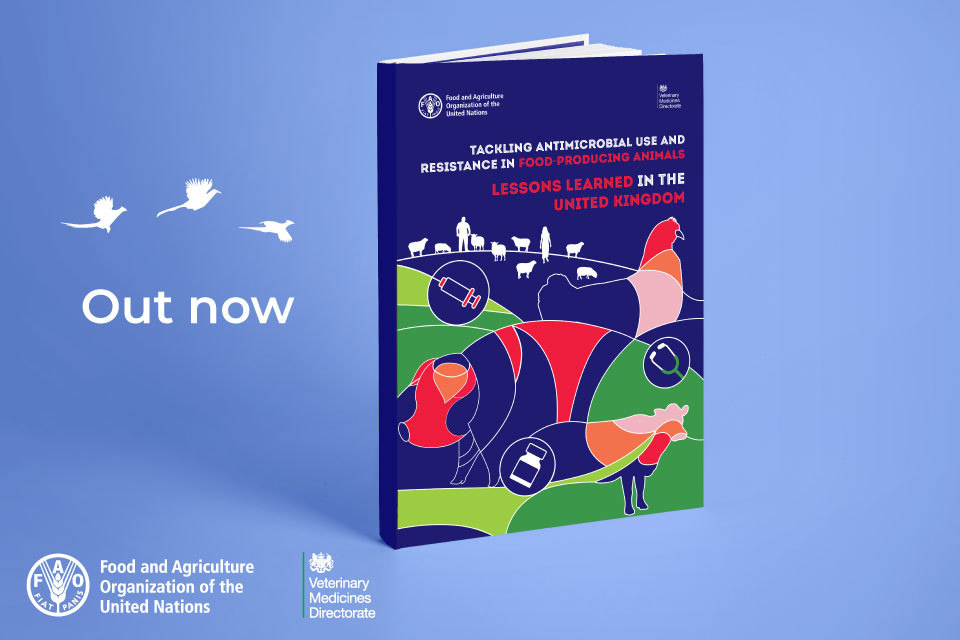
Multi-sectoral collaboration contributed to halving the sale of antibiotics in the UK livestock industry
Published By GOV.UK [English], Thu, Sep 29, 2022 3:01 AM
Significant success in tackling antimicrobial resistance (AMR) in food-producing animals can be achieved if the livestock industry takes ownership of the issue and drives the work of its sectors, according to a new UK case study on AMR published today.
Produced jointly by the Food and Agriculture Organization of the United Nations (FAO) and the UK’s Veterinary Medicines Directorate (VMD), FAO’s Reference Centre for AMR, “Tackling antimicrobial use and resistance in food-producing animals: Lessons learned in the United Kingdom”, is the third publication in the AMR case study series.
This FAO series explores case studies from around the world and helps countries share what works to accelerate global progress in preserving valuable medicines and promoting sustainable agriculture practices. The new publication highlights the UK’s successful collaborative approach to antimicrobial stewardship, which has led to the country halving the sale of antibiotics for food-producing animals since 2014.
“UK agriculture has undergone a transformation over the last few years, embedding the principles of responsible antimicrobial use across all sectors of livestock production through collaboration between government, vets and farmers culminating in the UK halving its sales of antibiotics for food-producing animals since 2014,”
said Christine Middlemiss, UK’s Chief Veterinary Officer.
“We are proud of the achievements detailed within this report, which represents a concerted effort from all those involved, and hope that the lessons here can inspire others to embark on their own stewardship journeys. The UK will continue to work alongside our global partners to promote the responsible use of antimicrobials,” she concluded.
“FAO thanks its partners in the United Kingdom for contributing their valuable experience,” said Keith Sumption, FAO Chief Veterinary Officer. “Together, we can work towards a future where AMR is controlled, leading to safe and sustainable agrifood systems for all.”
AMR is recognized as one of the greatest threats to humans, animals, plants and the environment. If left unchecked, antimicrobial resistance could lead to a USD 3.4 trillion drop in gross domestic product worldwide over the next decade. Responsible use of antimicrobials is key to addressing this growing challenge, as misuse and overuse of antimicrobials is a major cause of drug resistance.
Building trust across sectors
The United Kingdom is one of the most significant livestock producers in Europe, worth GBP 14.7 billion. Its livestock industry is responsible for the health and welfare of over one billion animals each year.
Although antimicrobials are essential medicines for animal welfare and protection, growing pressure from the media, the public and government highlighted the need to use antimicrobials responsibly and reduce the need by improving animal health and adopting preventative veterinary practices.
Remarkably, the industry took ownership of the issue by forming the Targets Task Force (TTF) convened by the Responsible Use of Medicines in Agriculture (RUMA) Alliance. Each sector has been able to look closely at its system and identify opportunities for improved antimicrobial use.
The cross-sectoral exchange of experience within the TTF enabled all sectors to benefit from the collective knowledge. Thanks to the increased awareness and understanding among producers and veterinarians, a fundamental and sustainable behaviour change has been brought about in the livestock industry.
Lessons learned
The publication identified key factors for the UK’s success, such as building a strong relationship between farmers and veterinarians, setting targets tailored to the challenges of each livestock sector, and ensuring access to data for target setting and monitoring.
Other elements highlighted were the importance of clear and transparent communication, collaboration and committed leadership. As a result of the voluntary, collaborative approach, the United Kingdom is now one of the countries with the lowest antimicrobial consumption in Europe and one of the countries with a significant livestock industry.
Based on a deeper understanding of the sectors, the original Targets Task Force was reconfigured as TTF2, which was tasked with developing a second set of targets for 2021-2024. The United Kingdom recognizes that there is no one-size-fits-all solution to tackling AMR, but hopes that the report will provide insight and a helpful resource for others exploring options to implement their own stewardship programmes.
Reducing the need for antimicrobials
Livestock products play a crucial role in feeding the ever-growing human population, so careful planning is needed to ensure sustainable food production and reduce the need for antimicrobials. At the heart of the UK’s strategy lies the importance of the One Health approach.
To support Members in their efforts to address AMR, FAO is currently developing an ambitious ten-year global initiative aimed at reducing the need for antimicrobials in agrifood systems (RENOFAM). It will be action-oriented, advocating for better biosecurity measures, vaccination programmes and public-private partnerships.
FAO recognizes and supports the United Kingdom’s continued efforts in dealing with AMR and is pleased to have designated an FAO Reference Centre for AMR in the United Kingdom. The Centre’s mandate is to support FAO in international knowledge transfer and capacity building. The Organization welcomes the United Kingdom’s commitment to helping others and learning from global partners.
Press release distributed by Media Pigeon on behalf of GOV.UK, on Sep 29, 2022. For more information subscribe and follow